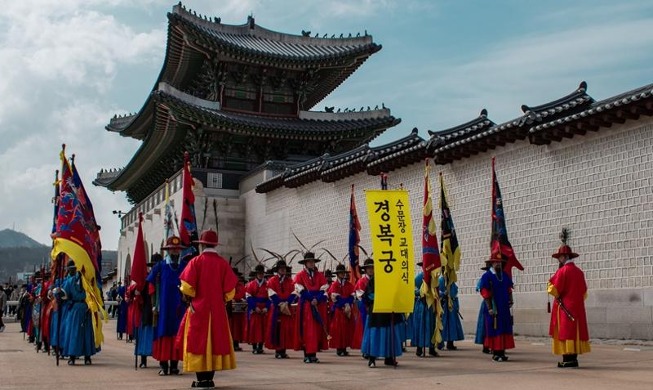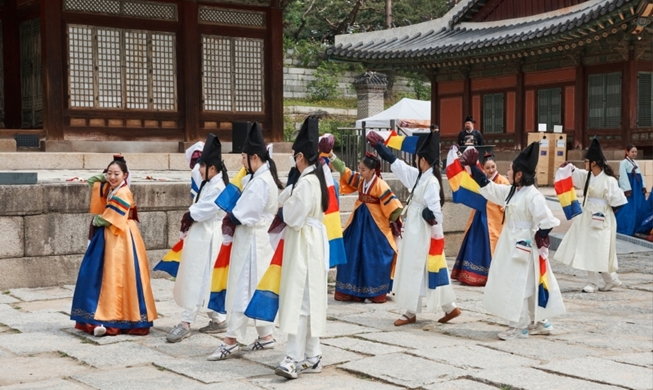-
 Korea.net's 24-hour YouTube channel
Korea.net's 24-hour YouTube channel- NEWS FOCUS
- ABOUT KOREA
- EVENTS
- RESOURCES
- GOVERNMENT
- ABOUT US
Coming back to the stage are “Equus” and “Offending the Audience.” The two plays, premiered in 1975 and 1978, respectively, have enjoyed more than forty years of popularity here.
The play “Equus” has been running since 1975. This year’s run starts on March 14 and lasts until May 17. (photo courtesy of the Shilhum Theater Group)
The legendary “Equus” returns
The play “Equus” was written by Peter Shaffer in 1973. Also known as the writer who penned the script for the famous 1984 film “Amadeus,” the British writer gained worldwide recognition as one of the greatest playwrights with his earlier work.
“Equus” means “horse” in Latin, and the play was inspired by a notorious crime that caused quite a stir across Britain at the time: a 17-year-old boy plunged a horseshoeing spike into the eyes of eight horses and blinded them.
The story develops as a child psychiatrist, Dr. Martin Dysart, treats the mysterious boy, named Alan Strang. Dysart tries to find the cause of the boy’s bizarre actions.
Ji Hyun-joon (left), as Alan Strang, and Ahn Seok-hwan, as Dr. Martic Dysart, perform in “Equus.” (photo courtesy of the Shilhum Theater Group)
Dysart learns that from an early age, Alan has been receiving conflicting viewpoints on religion by his parents. He has a devout Christian mother and an atheist father. Biblical tales about horses which his mother reads to him have made the boy worship the animals as representatives of God. For Alan, horses are something of an outlet for him to vent his oppressed desire, and something of his own self.
The concentration of tension and dynamism in scenes where the doctor asks pursuing questions to find what made the boy’s worship toward horses run out of control and cause a group of horses to run amok, still retains the same level of power, keeping the audience on the edge of their seats throughout the performance, as it has done over the last four decades.
What he finds through horses is religious, but also sexual, pleasure and a psychological shelter from the hypocritical and dreary society.
When he finally treats the boy, Dysart questions whether or not it is right to remove Alan’s intense sexual and religious commitment and his worship of the horses. The doctor regrets that, “Consequently, what I’ve done to him is turn the boy into a lifeless ghost without any passion.”
These lines reflect the sense of powerlessness and despondency felt by youth nowadays.
A scene from the play “Equus.” (photo courtesy of the Shilhum Theater Group)
Only those over 19 are allowed to see the show, as it features some nudity. “We tried to bring back the childhood, freedom and the primitive stage of humans, all that modern people have forgot,” said director Lee Han-seung of his show.
The play “Equus” has produced many stars since its domestic premiere. It is now possible, once again, to see the show until May 17, at the Lee Hae Rang Arts Theatre at Dongguk University in central Seoul.
Another legendary play “Offending the Audience” returns
Actors and actresses create an incessant barrage of nonsense for 90 minutes during the play “Offending the Audience.” (photo courtesy of IDA Entertainment)
“Offending the Audience” is the first play among numerous works written by Austrian writer Peter Handke. Handke is well-known for his experimental writing style and twisting “language," as found in his works, “The Hornets,” and, “Short Letter, Long Farewell,” to name just a few.
The 1966 play, “Offending the Audience,” also clearly embraces Handke’s provocative and experimental style, as if it plays with words, a style that breaks away from long-standing, conventional approaches.
In 1978 when the piece was put on the Korean stage, the audience, at first, was dumfounded at the shower of incoherent words coming from the cast, but soon it became fascinated by the word-play.
One of the actors says in the prologue, “Don’t expect to hear what you’ve never heard. Don’t expect to see what you’ve never seen.”
During the play, there is no plot. No story is told at all here. There are no stage settings, either. The audience soon finds itself showered by a seemingly endless stream of meaningless mumbojumbo and screams for 90 minutes.
The cast of “Offending the Audience,” Ki Joo-bong (left) says that, “This show makes the audience aware that language is constantly changing and the way in which it is spoken. I hope this show will be put on the global stage in the near future.” (photo courtesy of IDA Entertainment)
The show starts with nonsense and ends with jeers and even has the actors onstage swearing at the audience. It really offends the audience, as indicated in the title.
During their time on stage, the four speakers address the audience and speak in a bland litany that sounds plausible. However, if one listens closely, the characters merely pick up and leave off the discourse in a random order.
“The first time I saw the script, my heart raced with excitement for about a week,” said Ki Guk-seo, who has directed the show since its premier in 1978. “It came as a shock to me, in a pleasant way.”
When asked about the secret to the show’s more than four-decade long run, the director said that, “I think that the shocking, conventional way the characters speak directly to the audience, and let loose a stream of swear words and even throw a bucket of water over them, has really stirred up curiosity among spectators.”
A scene from the play “Offending the Audience.” (photo courtesy of IDA Entertainment)
The play “Offending the Audience” will run until June 1 at the Artone Theater in Seoul’s Daehangno district, a neighborhood famous for its theaters.
By Sohn JiAe
Korea.net Staff Writer
jiae5853@korea.kr













